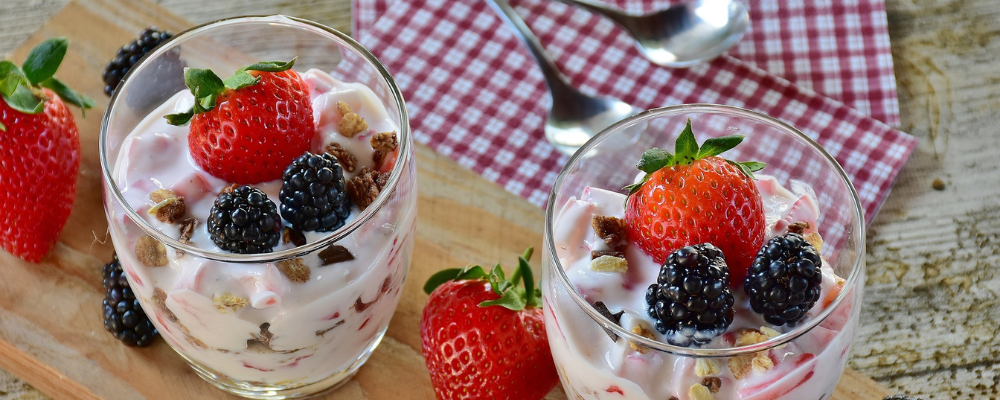
Prebiotics and Probiotics
— By Kayla Parsons, MS, RDN, Ph.D. Student, University of Maine Cooperative Extension
Prebiotics and probiotics play an important role in benefiting our gut health. Gut health refers to the health of our gut microbiome—the bacteria that lines our digestive tract. Some of the types of bacteria in our gut microbiome are good for our health, resulting in improved digestion, sleep health, brain health and can even prevent disease. You might be wondering, how does gut health relate to probiotics and prebiotics?
Probiotics are a type of healthy bacteria in the gut microbiome that improve our health.
Prebiotics are food for the probiotics, and when consumed, they cause more healthy gut bacteria to grow. We’ll go into more detail about this topic below.
What are prebiotics?
Prebiotics are specific parts of fiber that change the activity, or bacteria levels, in the gut microbiome. As described above, this is done by fueling the probiotic bacteria. One way to remember this concept is to think about your gut microbiome as a garden, and prebiotics as the fertilizer. Prebiotics, or the fertilizer, can help you grow healthy gut bacteria. Sources of prebiotics can be found where you can find fiber, so fruits, vegetables, beans and whole grains! Some examples of foods that contain prebiotics include:
- Apples
- Asparagus
- Artichokes
- Bananas
- Garlic
- Lentils
- Oats
- Sweet potatoes
Looking for recipes that contain prebiotics? Check out the list below featuring EFNEP’s recipes.
Now, what about probiotics?
Probiotics can be defined as live (good) bacteria that when eaten in adequate amounts, can create health benefits. Interestingly, probiotics come in many different strains, or types, all of which can have different and unique benefits to our health. Some of these benefits include vitamin K production, reduced inflammation, more regular bowel movements, and they can even create antibacterial compounds in our digestive tract that boost our immune system. Probiotic supplements have also become increasingly popular, but you should also consult a registered dietitian or your medical provider before beginning a new supplement. Probiotic supplements are not regulated by the Food and Drug Administration (FDA), so it can be difficult to tell if you’re buying bacteria that is healthy or a harmful strain. The best practice to do is to incorporate probiotic-containing foods into your diet. Some examples of the sources containing probiotics include:
- Aged cheeses such as cheddar, cottage cheese, and feta
- Buttermilk
- Kefir
- Kombucha
- Miso Soup
- Pickles
- Sauerkraut
- Tempeh
- Yogurt
EFNEP’s Mainely dish has several recipes that contain probiotics that can benefit your gut health. Check out some of the recipes below:
Resources
- Nourish Your Digestive System (North Dakota State University)
- Prebiotics: How to Feed Your Good Bacteria (PennState Extension)
